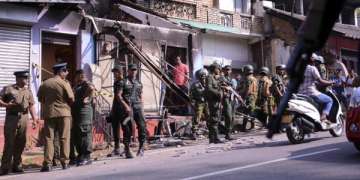Facebook staffs will now have to learn Sinhala in Sri Lanka after three-month anti-Muslim riots rocks the country. This step is to ensure to stop the spreading of inflammatory content in the country's local languages.
Social networking sites in Sri Lanka were blocked by authorities in March as provocative posts by Buddhist hardliners fanned religious violence that left three people dead and reduced hundreds of mosques, homes and businesses to ashes in the central Kandy district after a Sinhalese man died in a reported assault by a group of Muslim men following a private dispute.
Although the ban was lifted on June 7. President Maithripala Sirisena has ordered on lifting the ban on Facebook after his secretary met with company representatives.
However, Facebook was asked to act against the contagion of hate speech that were made on the site.
According to some media reports, Facebook spokeswoman Amrit Ahuja has accepted their mistakes and said they were “slow” and were not able to take a step at right time.
"We did make mistakes and we were slow," she said.
Ahuja added that Facebook was committed to hiring more Sinhala speakers, but she didn’t reveal how many were currently employed.
Ahuja said Facebook was working with civil society organisations to familiarise its staff with Sinhala insults and racist epithets.
Sri Lanka’s telecommunication minister Harin Fernando has also said that Facebook needs more Sinhala speaking staff.
"This is the problem we are trying to address with Facebook. They need more Sinhala resources", he said.
Since the start of the violence in March, two high-level delegations from the company have visited Sri Lanka, where ethnic divisions linger after decades of war, to assure the government of its intent.
“The decision to impose an island-wide blackout on Facebook was taken as a last resort to prevent an escalation of violence,” said Fernando.
The social networking site was used by Sinhala extremists to recruit rioters to organise their travel to spread violence.
Fernando told some media outlets that Facebook users over the country also lodged thousands of complaints over extremist content.
"It was not something that I liked doing. But if we didn't block Facebook, the violence would have spread out of control," he said.
To end the riots the army was given special powers to restore order under the first state of emergency declared in the 21-million-strong nation since the end of the civil war in 2009.
Latest World News

